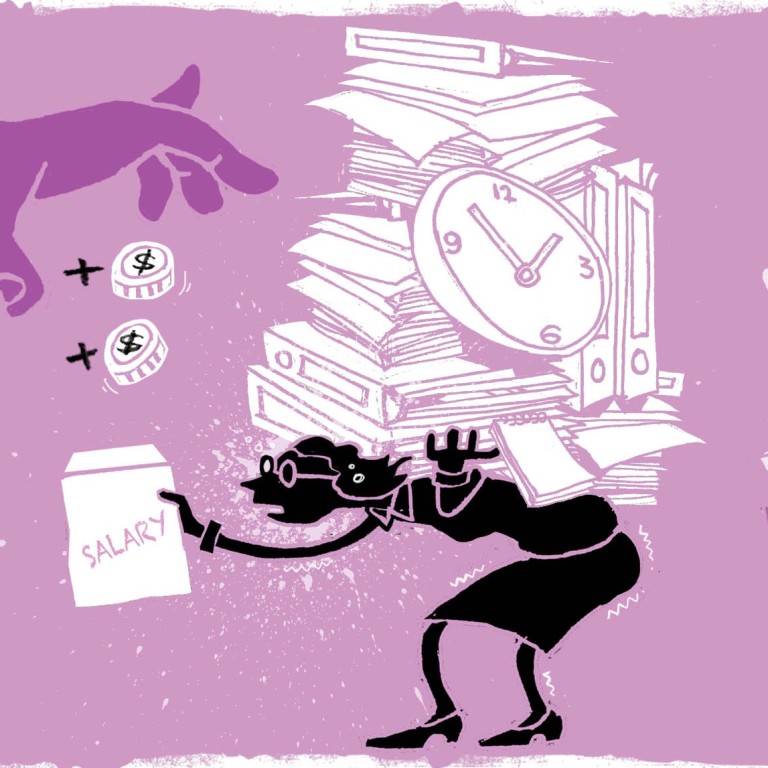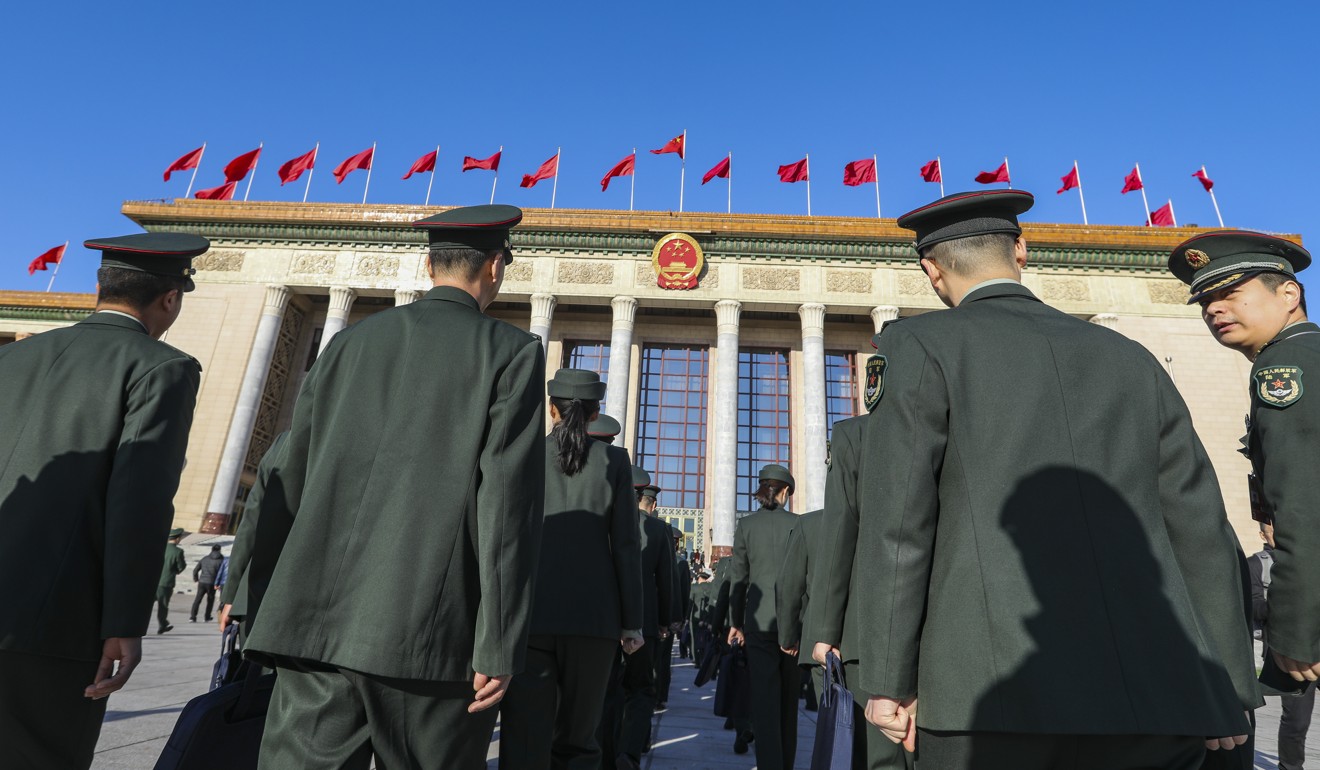
Exclusive | China’s civil servants find there is a price to pay for corruption-busting salary boost
- Efforts to reduce bribery through higher pay have seen some salaries triple
- Slashed benefits and bigger workloads leave bureaucrats feeling dissatisfied
Complaints about low pay among China’s 40 million civil servants, at all levels of government, are nothing new but in recent years the government has been boosting its bureaucrats’ incomes in a move some people have linked to a wider anti-corruption campaign.
While the extra money has been welcomed, some civil servants say they are working harder for fewer benefits, while still receiving what they feel is a meagre salary, compared to other workers.
For the first five years of his career as a municipal civil servant in Beijing, Wang Shan (not his real name) did not see a pay rise. Then, in 2015, his monthly salary more than doubled, from 3,000 yuan to 7,000 yuan (US$450 to $1,000).
But, he says, at the same time his workload increased and, on top of that, some benefits he used to enjoy have been gradually whittled away. His performance is also being tightly watched, he says.

The November 2015 pay rise was the first in nine years for China’s bureaucrats, with some basic salaries doubled or even tripled. The increase was also backdated to October 2014.
The lowest ranked national civil servants saw the two major components of their basic salary rise from a combined 630 yuan to a combined 1,320 yuan. Those in the highest rank – including President Xi Jinping and Premier Li Keqiang – saw their pay increase from 7,020 yuan to 11,385 yuan.
Low pay and lots of work: the irresistible draw of China’s civil service
New rules were also introduced to give civil servants increases every two years, starting in 2016 when combined basic salaries rose roughly 300 yuan at the lowest level and about 3,000 yuan at the highest.
In 2018 civil servants saw a further rise in pay of between roughly 200 yuan to 2,000 yuan.
The salary rises have been widely interpreted as a way to deter corruption and bribery and hold government workers accountable for their performance by giving them a more transparent and liveable wage. In the past, low pay has been singled out as a factor driving workers to seek supplementary sources of income, thus contributing to corruption.
John Burns, emeritus professor of the Department of Politics and Public Administration at the University of Hong Kong, said the reason for the salary rise in 2015 was sound.
“If civil servants are no longer able to accept bribes and give them for promotions, then clearly their salaries are inadequate, given the high cost of living in urban China,” he said.
Zhu Lijia, a professor at the Chinese Academy of Governance, said salary increases should keep pace with GDP growth.
Other countries, such as Singapore, have also been using salary increases or bonuses to keep civil servants clean.
Last year, Singapore was ranked the 3rd least corrupt country in the world, according to Transparency International's Corruption Perceptions Index. Mainland China ranked 87th and Hong Kong 14th.
At the 2017 opening of Singapore’s Corruption Reporting and Heritage Centre, Prime Minister Lee Hsien Loong said the country had a “professional public service that is paid fair and realistic wages benchmarked against the private sector, which reduces the temptation to accept bribes”, according to The Straits Times.
In China, while civil servants have welcomed the pay increases, their jobs have become less attractive due to the restrictions on some of the benefits they previously enjoyed.
Along with their pay rise in 2015, government employees also found their pension costs increased as they were no longer exempt from paying 8 per cent of their salaries into the state pension system. Civil servants now have the same pension contribution requirement as private sector employees.
In recent years, governments at all levels have also cut back on “unregulated subsidies”, such as awards at work and subsidised business trips. The official line is that government employees need to lead frugal lives.
Finance Minister Liu Kun told People's Daily in January that government budgets needed to be tightly controlled.
“For unnecessary spending, the finance department will not shed a cent,” he said.
Areas targeted for budget cuts could include spending on meals, travel, stationery and office plants, People's Daily reported.
Civil servants at the bottom level have felt the impact. Wang says his department used to organise activities such as outings, meals, or gift-giving several times a year, but not any more.
“You have to keep connected to people in the same department in different districts or towns,” he said. “You’d organise activities and outings several times a year, sometimes in Beijing, sometimes in neighbouring areas.
“And of course you would stay in hotels for a couple of days, which definitely included meals.”
Wang’s department used to organise trips for all its employees at least once a year. But such activities have been deemed extravagant and no longer occur.
The rules have become so tight that many civil servants also need to exhibit frugality in their personal affairs. Weddings have become sensitive, and there are tight rules governing who and how many to invite and what venues to hold them in.
The workload has become visibly heavier, too, in recent years, according to a civil servant with a national government ministry. Li Wei (not his real name) says he now often works over the weekend and into the night on weekdays.
“Our salary isn't proportional to the work effort invested,” he said.
Wang said civil servants’ performance at work was now subject to close scrutiny.
“If you check the website of the Beijing disciplinary committee, they update any problems they see, and the related personnel will be punished,” he said, adding that punitive measures could include cancellation of a promotion or bonus.
There have been complaints that the salary increases have not been large enough to offset the reduction in benefits and heavier workloads, leading some people to question whether being a civil servant is becoming a less desirable job.
“We need to look at the turnover rate, and the extent to which civil servants are resigning because the political pressure is too great,” Burns said. “There is huge variation in the cost of living throughout China. All of this must be considered. To turn around the problem of civil servants quitting their posts, more incentive is needed.”
However, he said, people joined the civil service for many reasons, including the job itself, stability, upward social mobility, or better business opportunities in the future if they should leave. Increased salaries were only one factor, Burns said.
Wang is already looking forward to his next pay rise, due in 2020, although there have been no details about exactly when next year it will take effect.
“Compared with activities such as travelling or meals, the money would be better spent giving employees real benefits,” he said. “Of course we would rather have real money in our pockets.”
Pseudonyms have been used for the civil servants in this story to protect their identities.

.jpg?itok=H5_PTCSf&v=1700020945)